(pdf) Supporting the Individual Journey through Integrated Health and Social Care
VerifiedAdded on 2021/01/01
|6
|1431
|138
AI Summary
Contribute Materials
Your contribution can guide someone’s learning journey. Share your
documents today.
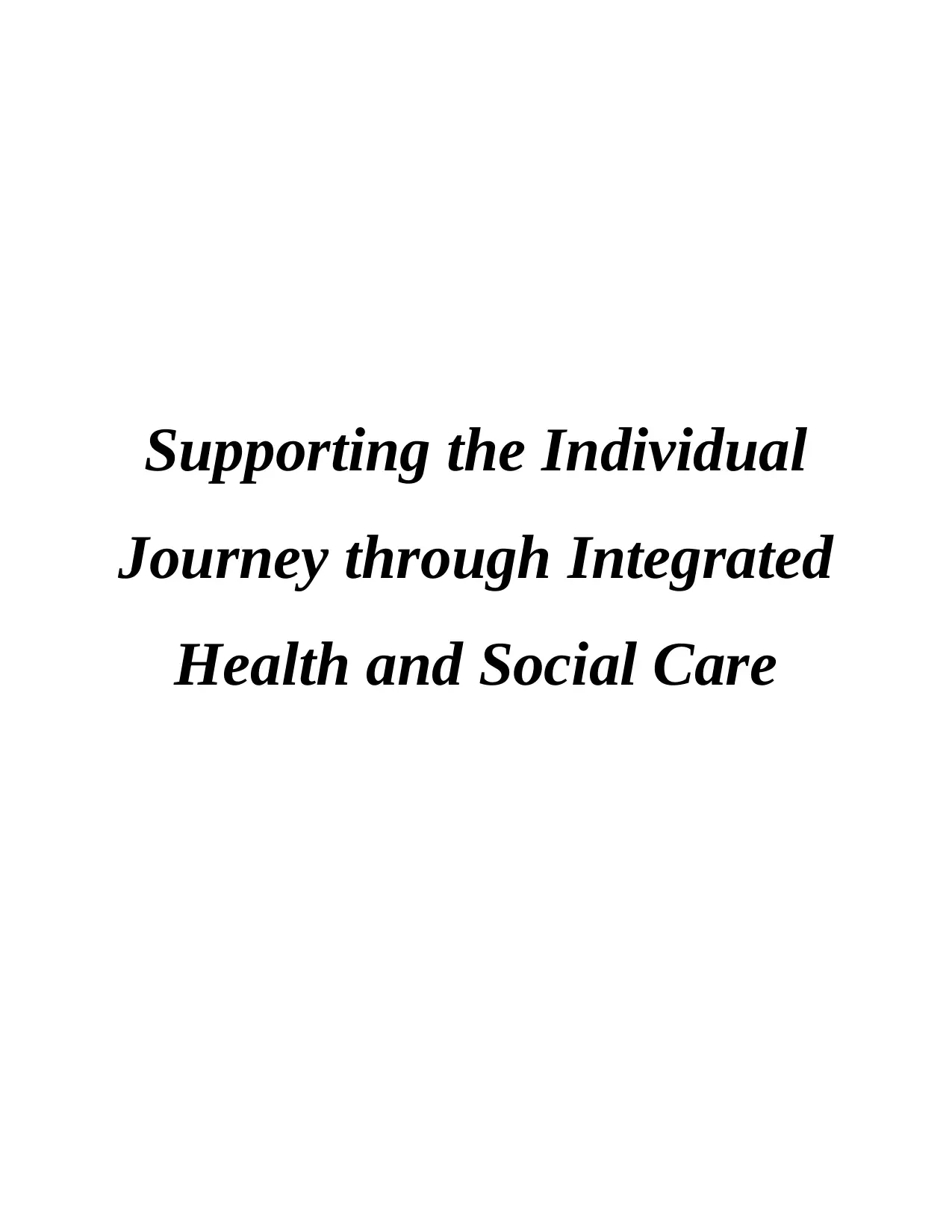
Supporting the Individual
Journey through Integrated
Health and Social Care
Journey through Integrated
Health and Social Care
Secure Best Marks with AI Grader
Need help grading? Try our AI Grader for instant feedback on your assignments.
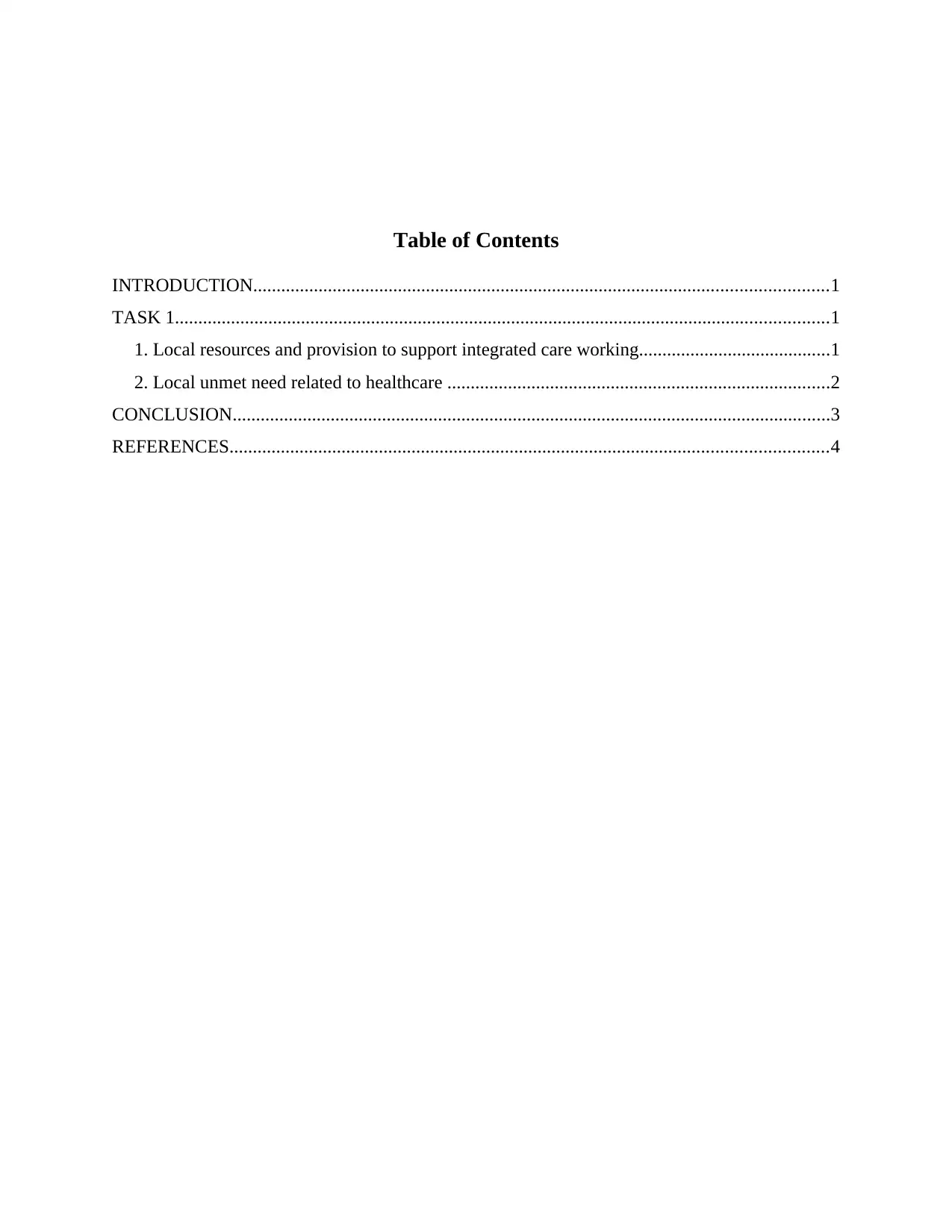
Table of Contents
INTRODUCTION...........................................................................................................................1
TASK 1............................................................................................................................................1
1. Local resources and provision to support integrated care working.........................................1
2. Local unmet need related to healthcare ..................................................................................2
CONCLUSION................................................................................................................................3
REFERENCES................................................................................................................................4
INTRODUCTION...........................................................................................................................1
TASK 1............................................................................................................................................1
1. Local resources and provision to support integrated care working.........................................1
2. Local unmet need related to healthcare ..................................................................................2
CONCLUSION................................................................................................................................3
REFERENCES................................................................................................................................4
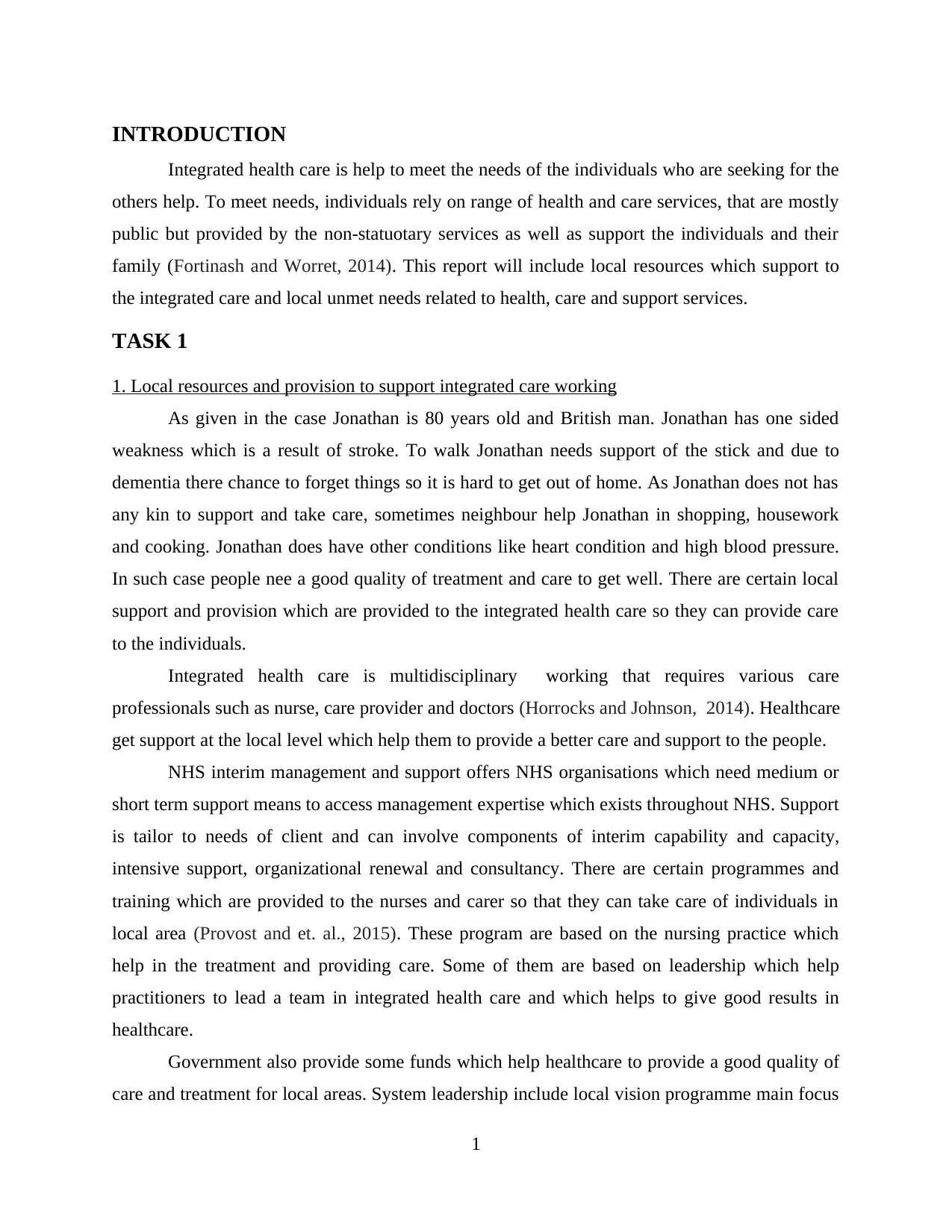
INTRODUCTION
Integrated health care is help to meet the needs of the individuals who are seeking for the
others help. To meet needs, individuals rely on range of health and care services, that are mostly
public but provided by the non-statuotary services as well as support the individuals and their
family (Fortinash and Worret, 2014). This report will include local resources which support to
the integrated care and local unmet needs related to health, care and support services.
TASK 1
1. Local resources and provision to support integrated care working
As given in the case Jonathan is 80 years old and British man. Jonathan has one sided
weakness which is a result of stroke. To walk Jonathan needs support of the stick and due to
dementia there chance to forget things so it is hard to get out of home. As Jonathan does not has
any kin to support and take care, sometimes neighbour help Jonathan in shopping, housework
and cooking. Jonathan does have other conditions like heart condition and high blood pressure.
In such case people nee a good quality of treatment and care to get well. There are certain local
support and provision which are provided to the integrated health care so they can provide care
to the individuals.
Integrated health care is multidisciplinary working that requires various care
professionals such as nurse, care provider and doctors (Horrocks and Johnson, 2014). Healthcare
get support at the local level which help them to provide a better care and support to the people.
NHS interim management and support offers NHS organisations which need medium or
short term support means to access management expertise which exists throughout NHS. Support
is tailor to needs of client and can involve components of interim capability and capacity,
intensive support, organizational renewal and consultancy. There are certain programmes and
training which are provided to the nurses and carer so that they can take care of individuals in
local area (Provost and et. al., 2015). These program are based on the nursing practice which
help in the treatment and providing care. Some of them are based on leadership which help
practitioners to lead a team in integrated health care and which helps to give good results in
healthcare.
Government also provide some funds which help healthcare to provide a good quality of
care and treatment for local areas. System leadership include local vision programme main focus
1
Integrated health care is help to meet the needs of the individuals who are seeking for the
others help. To meet needs, individuals rely on range of health and care services, that are mostly
public but provided by the non-statuotary services as well as support the individuals and their
family (Fortinash and Worret, 2014). This report will include local resources which support to
the integrated care and local unmet needs related to health, care and support services.
TASK 1
1. Local resources and provision to support integrated care working
As given in the case Jonathan is 80 years old and British man. Jonathan has one sided
weakness which is a result of stroke. To walk Jonathan needs support of the stick and due to
dementia there chance to forget things so it is hard to get out of home. As Jonathan does not has
any kin to support and take care, sometimes neighbour help Jonathan in shopping, housework
and cooking. Jonathan does have other conditions like heart condition and high blood pressure.
In such case people nee a good quality of treatment and care to get well. There are certain local
support and provision which are provided to the integrated health care so they can provide care
to the individuals.
Integrated health care is multidisciplinary working that requires various care
professionals such as nurse, care provider and doctors (Horrocks and Johnson, 2014). Healthcare
get support at the local level which help them to provide a better care and support to the people.
NHS interim management and support offers NHS organisations which need medium or
short term support means to access management expertise which exists throughout NHS. Support
is tailor to needs of client and can involve components of interim capability and capacity,
intensive support, organizational renewal and consultancy. There are certain programmes and
training which are provided to the nurses and carer so that they can take care of individuals in
local area (Provost and et. al., 2015). These program are based on the nursing practice which
help in the treatment and providing care. Some of them are based on leadership which help
practitioners to lead a team in integrated health care and which helps to give good results in
healthcare.
Government also provide some funds which help healthcare to provide a good quality of
care and treatment for local areas. System leadership include local vision programme main focus
1
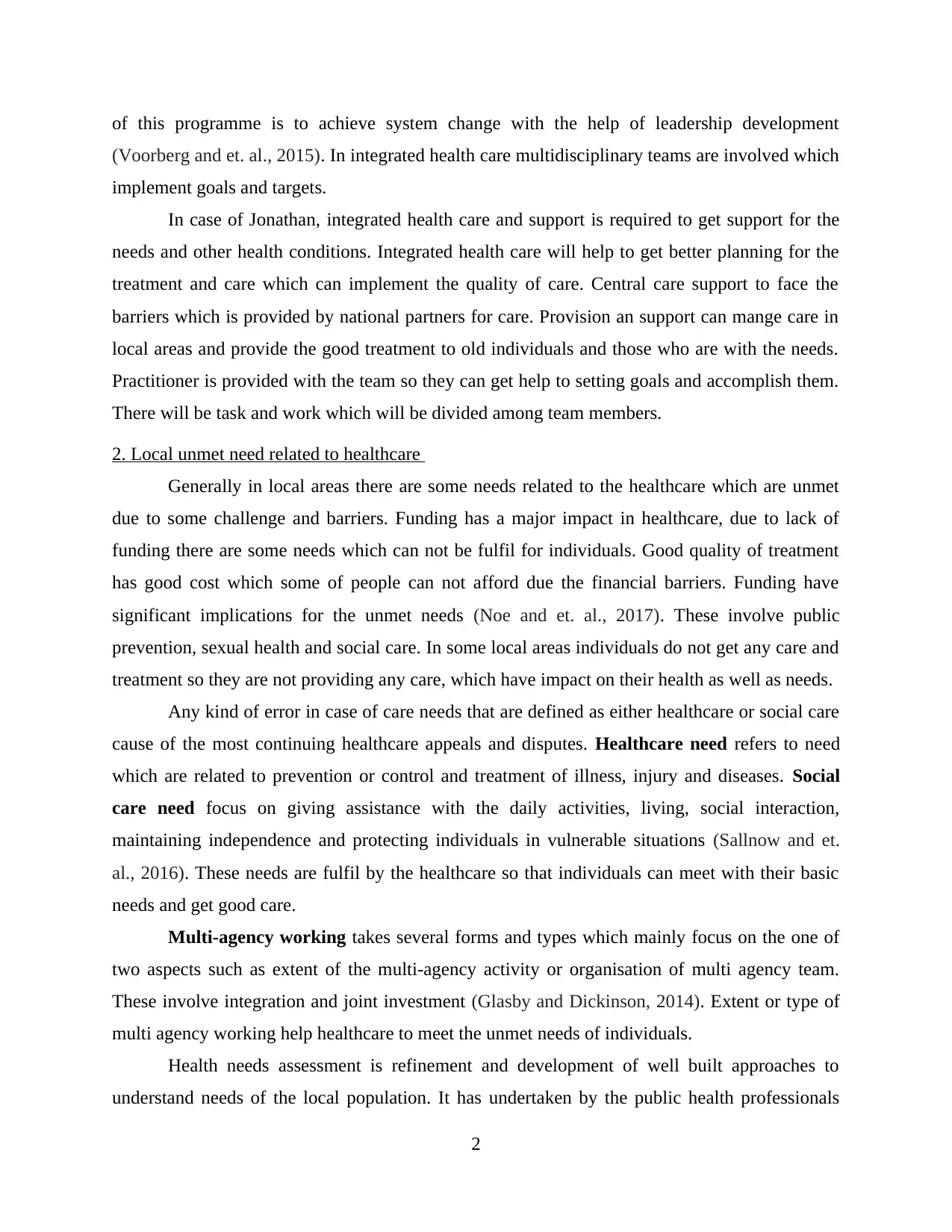
of this programme is to achieve system change with the help of leadership development
(Voorberg and et. al., 2015). In integrated health care multidisciplinary teams are involved which
implement goals and targets.
In case of Jonathan, integrated health care and support is required to get support for the
needs and other health conditions. Integrated health care will help to get better planning for the
treatment and care which can implement the quality of care. Central care support to face the
barriers which is provided by national partners for care. Provision an support can mange care in
local areas and provide the good treatment to old individuals and those who are with the needs.
Practitioner is provided with the team so they can get help to setting goals and accomplish them.
There will be task and work which will be divided among team members.
2. Local unmet need related to healthcare
Generally in local areas there are some needs related to the healthcare which are unmet
due to some challenge and barriers. Funding has a major impact in healthcare, due to lack of
funding there are some needs which can not be fulfil for individuals. Good quality of treatment
has good cost which some of people can not afford due the financial barriers. Funding have
significant implications for the unmet needs (Noe and et. al., 2017). These involve public
prevention, sexual health and social care. In some local areas individuals do not get any care and
treatment so they are not providing any care, which have impact on their health as well as needs.
Any kind of error in case of care needs that are defined as either healthcare or social care
cause of the most continuing healthcare appeals and disputes. Healthcare need refers to need
which are related to prevention or control and treatment of illness, injury and diseases. Social
care need focus on giving assistance with the daily activities, living, social interaction,
maintaining independence and protecting individuals in vulnerable situations (Sallnow and et.
al., 2016). These needs are fulfil by the healthcare so that individuals can meet with their basic
needs and get good care.
Multi-agency working takes several forms and types which mainly focus on the one of
two aspects such as extent of the multi-agency activity or organisation of multi agency team.
These involve integration and joint investment (Glasby and Dickinson, 2014). Extent or type of
multi agency working help healthcare to meet the unmet needs of individuals.
Health needs assessment is refinement and development of well built approaches to
understand needs of the local population. It has undertaken by the public health professionals
2
(Voorberg and et. al., 2015). In integrated health care multidisciplinary teams are involved which
implement goals and targets.
In case of Jonathan, integrated health care and support is required to get support for the
needs and other health conditions. Integrated health care will help to get better planning for the
treatment and care which can implement the quality of care. Central care support to face the
barriers which is provided by national partners for care. Provision an support can mange care in
local areas and provide the good treatment to old individuals and those who are with the needs.
Practitioner is provided with the team so they can get help to setting goals and accomplish them.
There will be task and work which will be divided among team members.
2. Local unmet need related to healthcare
Generally in local areas there are some needs related to the healthcare which are unmet
due to some challenge and barriers. Funding has a major impact in healthcare, due to lack of
funding there are some needs which can not be fulfil for individuals. Good quality of treatment
has good cost which some of people can not afford due the financial barriers. Funding have
significant implications for the unmet needs (Noe and et. al., 2017). These involve public
prevention, sexual health and social care. In some local areas individuals do not get any care and
treatment so they are not providing any care, which have impact on their health as well as needs.
Any kind of error in case of care needs that are defined as either healthcare or social care
cause of the most continuing healthcare appeals and disputes. Healthcare need refers to need
which are related to prevention or control and treatment of illness, injury and diseases. Social
care need focus on giving assistance with the daily activities, living, social interaction,
maintaining independence and protecting individuals in vulnerable situations (Sallnow and et.
al., 2016). These needs are fulfil by the healthcare so that individuals can meet with their basic
needs and get good care.
Multi-agency working takes several forms and types which mainly focus on the one of
two aspects such as extent of the multi-agency activity or organisation of multi agency team.
These involve integration and joint investment (Glasby and Dickinson, 2014). Extent or type of
multi agency working help healthcare to meet the unmet needs of individuals.
Health needs assessment is refinement and development of well built approaches to
understand needs of the local population. It has undertaken by the public health professionals
2
Secure Best Marks with AI Grader
Need help grading? Try our AI Grader for instant feedback on your assignments.
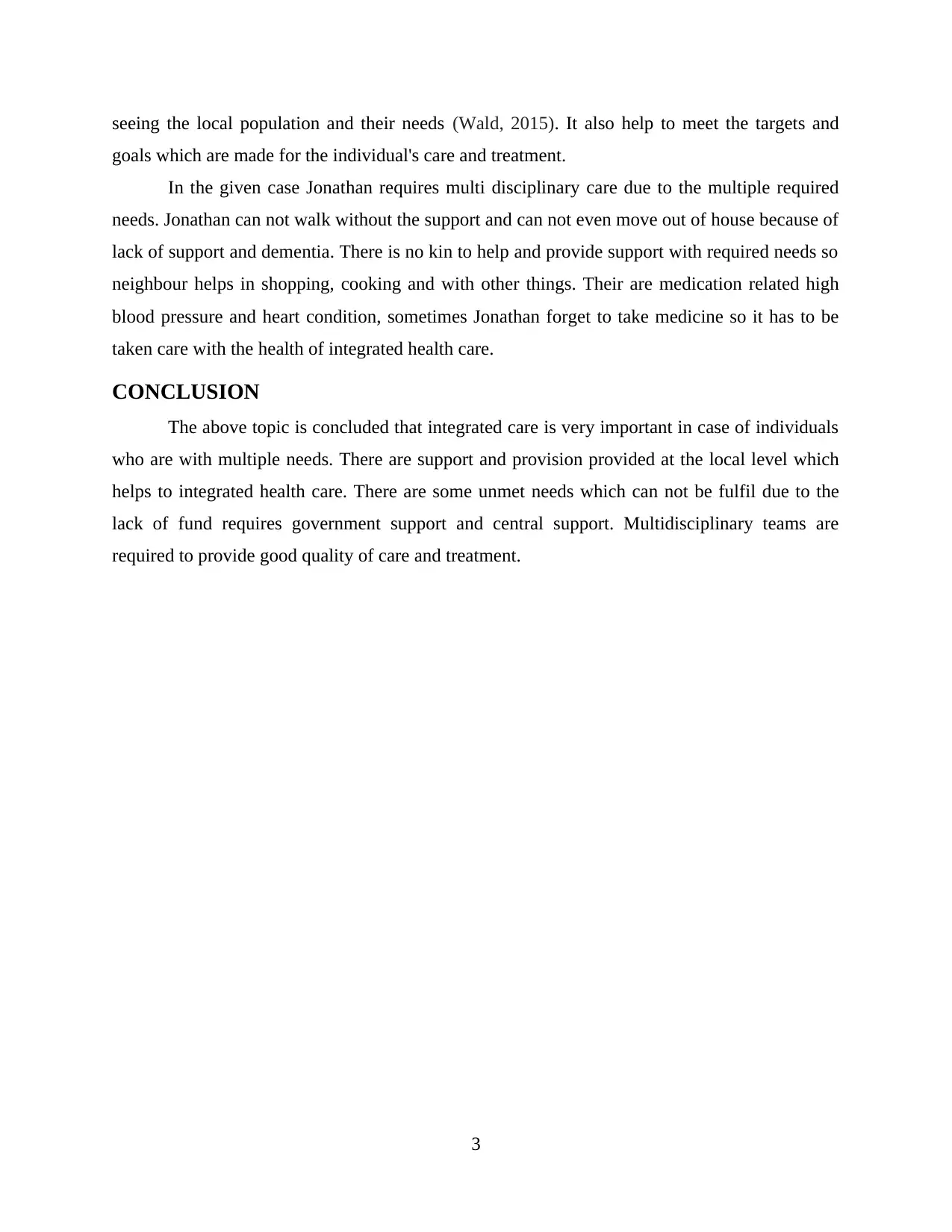
seeing the local population and their needs (Wald, 2015). It also help to meet the targets and
goals which are made for the individual's care and treatment.
In the given case Jonathan requires multi disciplinary care due to the multiple required
needs. Jonathan can not walk without the support and can not even move out of house because of
lack of support and dementia. There is no kin to help and provide support with required needs so
neighbour helps in shopping, cooking and with other things. Their are medication related high
blood pressure and heart condition, sometimes Jonathan forget to take medicine so it has to be
taken care with the health of integrated health care.
CONCLUSION
The above topic is concluded that integrated care is very important in case of individuals
who are with multiple needs. There are support and provision provided at the local level which
helps to integrated health care. There are some unmet needs which can not be fulfil due to the
lack of fund requires government support and central support. Multidisciplinary teams are
required to provide good quality of care and treatment.
3
goals which are made for the individual's care and treatment.
In the given case Jonathan requires multi disciplinary care due to the multiple required
needs. Jonathan can not walk without the support and can not even move out of house because of
lack of support and dementia. There is no kin to help and provide support with required needs so
neighbour helps in shopping, cooking and with other things. Their are medication related high
blood pressure and heart condition, sometimes Jonathan forget to take medicine so it has to be
taken care with the health of integrated health care.
CONCLUSION
The above topic is concluded that integrated care is very important in case of individuals
who are with multiple needs. There are support and provision provided at the local level which
helps to integrated health care. There are some unmet needs which can not be fulfil due to the
lack of fund requires government support and central support. Multidisciplinary teams are
required to provide good quality of care and treatment.
3
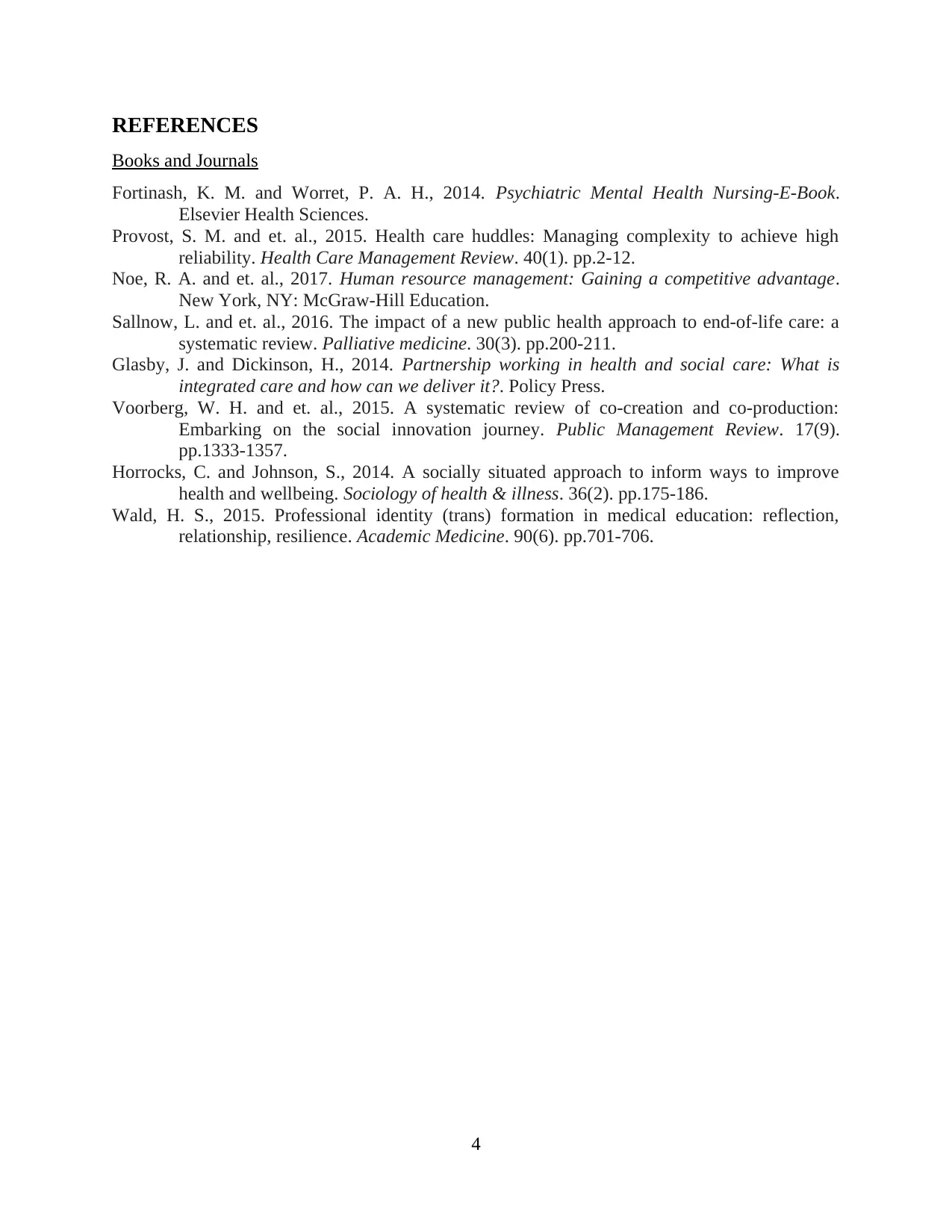
REFERENCES
Books and Journals
Fortinash, K. M. and Worret, P. A. H., 2014. Psychiatric Mental Health Nursing-E-Book.
Elsevier Health Sciences.
Provost, S. M. and et. al., 2015. Health care huddles: Managing complexity to achieve high
reliability. Health Care Management Review. 40(1). pp.2-12.
Noe, R. A. and et. al., 2017. Human resource management: Gaining a competitive advantage.
New York, NY: McGraw-Hill Education.
Sallnow, L. and et. al., 2016. The impact of a new public health approach to end-of-life care: a
systematic review. Palliative medicine. 30(3). pp.200-211.
Glasby, J. and Dickinson, H., 2014. Partnership working in health and social care: What is
integrated care and how can we deliver it?. Policy Press.
Voorberg, W. H. and et. al., 2015. A systematic review of co-creation and co-production:
Embarking on the social innovation journey. Public Management Review. 17(9).
pp.1333-1357.
Horrocks, C. and Johnson, S., 2014. A socially situated approach to inform ways to improve
health and wellbeing. Sociology of health & illness. 36(2). pp.175-186.
Wald, H. S., 2015. Professional identity (trans) formation in medical education: reflection,
relationship, resilience. Academic Medicine. 90(6). pp.701-706.
4
Books and Journals
Fortinash, K. M. and Worret, P. A. H., 2014. Psychiatric Mental Health Nursing-E-Book.
Elsevier Health Sciences.
Provost, S. M. and et. al., 2015. Health care huddles: Managing complexity to achieve high
reliability. Health Care Management Review. 40(1). pp.2-12.
Noe, R. A. and et. al., 2017. Human resource management: Gaining a competitive advantage.
New York, NY: McGraw-Hill Education.
Sallnow, L. and et. al., 2016. The impact of a new public health approach to end-of-life care: a
systematic review. Palliative medicine. 30(3). pp.200-211.
Glasby, J. and Dickinson, H., 2014. Partnership working in health and social care: What is
integrated care and how can we deliver it?. Policy Press.
Voorberg, W. H. and et. al., 2015. A systematic review of co-creation and co-production:
Embarking on the social innovation journey. Public Management Review. 17(9).
pp.1333-1357.
Horrocks, C. and Johnson, S., 2014. A socially situated approach to inform ways to improve
health and wellbeing. Sociology of health & illness. 36(2). pp.175-186.
Wald, H. S., 2015. Professional identity (trans) formation in medical education: reflection,
relationship, resilience. Academic Medicine. 90(6). pp.701-706.
4
1 out of 6
Related Documents
Your All-in-One AI-Powered Toolkit for Academic Success.
+13062052269
info@desklib.com
Available 24*7 on WhatsApp / Email
![[object Object]](/_next/static/media/star-bottom.7253800d.svg)
Unlock your academic potential
© 2024 | Zucol Services PVT LTD | All rights reserved.





